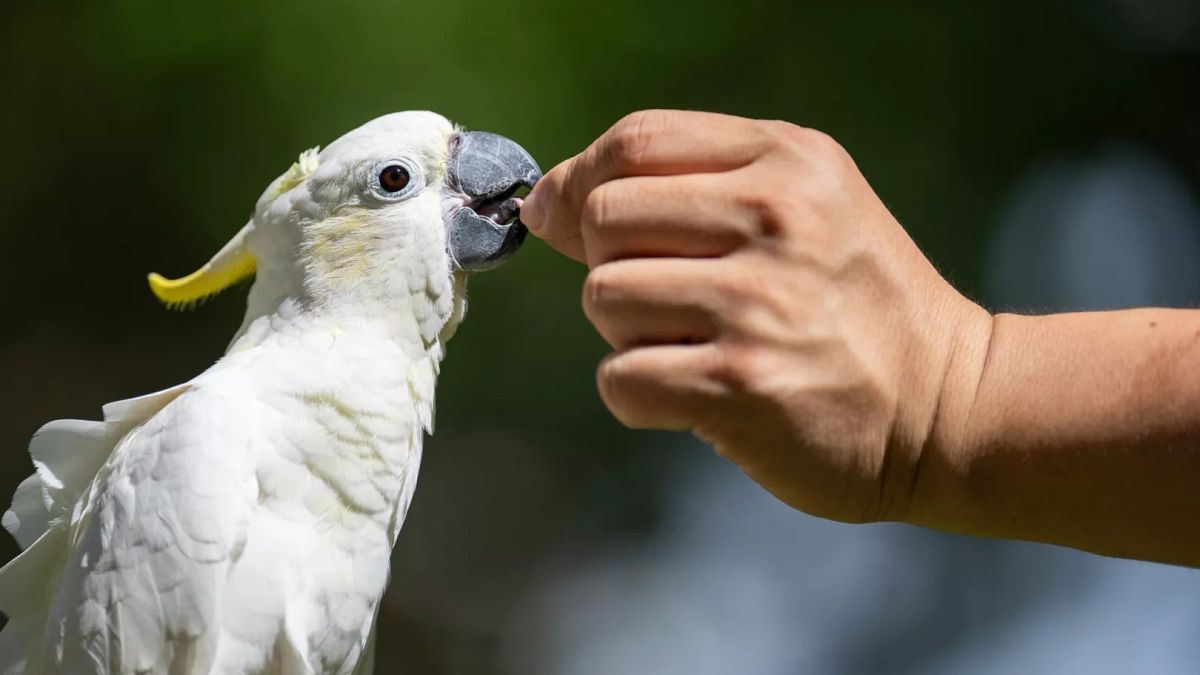Critically endangered yellow-crested cockatoos found an unexpected sanctuary among Hong Kong’s towering skyscrapers, but like their human neighbours, they now face trouble finding a place to call home.
Native to Indonesia and East Timor, the snow-white birds, their crests flashing like yellow crowns, squawk through the urban parks of the Asian financial hub. They make up roughly 10 per cent of the species’ global wild population, which numbers only up to 2,000 mature birds.
Research shows the city’s cockatoo population has stagnated as the birds, which live in tree cavities, are losing natural nesting spaces in old trees due to typhoons and government tree trimming for public safety. That’s adding to global pressures on cockatoos, such as the illegal pet trade and climate change.
Hong Kong’s conservationists have stepped in with a solution: installing artificial nest boxes that mimic these natural hollows.
Astrid Andersson, a postdoctoral researcher at the University of Hong Kong who led the project, said a pair of birds had already settled in a nest box her team fixed onto a tree on her campus, the city’s oldest university. She aims to install 10 boxes by year’s end and ultimately boost that figure to 50 in the next few years across Hong Kong Island.
“And then they can continue to live in the city,” she said.
Pet trade and habitat loss push species in Indonesia to the brink
Once widespread across island chains from central to eastern Indonesia and East Timor, the yellow-crested cockatoo has vanished from many islands and clings to survival on others.
The International Union for Conservation of Nature says as much as 90 per cent of the population is thought to have disappeared since 1978, mainly due to trapping for the pet trade.
Weak enforcement of a 1994 export ban by Indonesia has allowed the trade to persist, including targeting chicks. In 2015, Indonesian police arrested a man on suspicion of smuggling about 20 birds by stuffing them inside water bottles.
Deforestation from farming and logging is another problem. Indonesia lost 107,000 square kilometres of its original tropical rainforest between 2002 and 2024, an area about the size of Iceland, accounting for about a third of all tree cover loss during that time, according to Global Forest Watch.
Climate change is making things worse. Rising temperatures dry out forests, leaving them more vulnerable to fires. Many birds live on volcanic islands, where eruptions can spark wildfires in the parched landscapes.
“The fires are humongous,” said Bonnie Zimmermann, director of the Indonesian Parrot Project, a nonprofit organisation.
Hong Kong bird market sales raise concerns
The wild cockatoos in Hong Kong’s urban parks could be from escaped or released pets, Andersson said. One urban legend says they descended from pet birds released by a British governor before he surrendered to invading Japanese troops in 1941. Hong Kong, a former British colony, returned to Chinese control in 1997.
Hong Kong bans commercial trading in wild-caught cockatoos, but allows captive-bred sales for operations registered under the Convention on International Trade in Endangered Species of Wild Fauna and Flora, or CITES. However, there is no such breeding operation registered in the city.
In August, a three-month-old chick was priced at 14,000 Hong Kong dollars (€1,533) in the city’s bird market.
A 2017-2018 survey by Andersson found 33 cockatoos for sale, triple the number of birds imported since 2005. They could be from home breeding, trafficking from abroad or Hong Kong’s wild population, the university said in a statement.
Andersson has developed a forensic test to help distinguish between those who live in the wild and those bred in captivity, and she hopes it can be applied in the market one day.
Many Hong Kongers do not know the birds are critically endangered. Dreamy Cheung said she was unaware when she bought her pet, Mochi, in 2021 for 20,000 Hong Kong dollars (€2,191). She felt anxious after learning of her intelligent bird’s endangered status, especially given its missing identification leg ring and possible illegal origins.
“It’s like taking away someone else’s baby,” she said.
In an emailed statement to The Associated Press, the Agriculture, Fisheries and Conservation Department said the government was committed to protecting endangered species, with regular inspections at markets and shops. It has no record of cockatoo poaching in the past five years, but it will investigate any reports, it said.
It added that it will provide advice on bird conservation for any tree trimming that may affect wild birds.
Creating space for coexistence
Hong Kong’s cockatoos symbolise how humans and wildlife can coexist in a highly urbanised environment, said Andersson. Local birds also may carry some distinct genetic lineages missing in their native range, helping to sustain their genetic diversity.
“Hopefully, Hong Kong’s population will be able to contribute to saving this species from extinction,” she said.
Her team plans to use cameras installed inside the nest boxes to collect data about cockatoo reproductive behaviour, a topic that has not been extensively studied.
Cockatoos squawked in the upper branches of a tree in a park in the city’s Causeway Bay area as conservationist Harry Wong installed a wood chip-filled nesting box.
Wong tried a similar project a decade ago without success.
This time, watching cockatoos occupy a nest box at the University of Hong Kong just two months after it was installed, he was excited and surprised.
“We can create small things in the city that allow the animals who live here to coexist with us,” he said.

